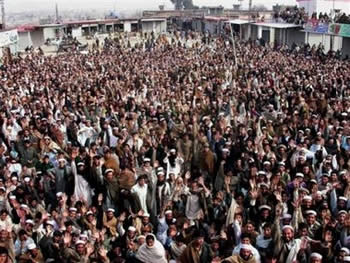Untitled Document
· Musharraf under pressure after air strike kills 18
· Reports cast doubt on presence of al-Qaida target
Thousands of angry protesters took to the streets across Pakistan yesterday
to condemn an American air strike aimed at al-Qaida's deputy leader, Ayman al-Zawahiri,
that left at least 18 people dead.
 |
|
Pakistani tribal villagers living in the neighboring village of Inayat Qala, about six kilometers (four miles) from the northwestern Pakistani village of Damadola, near the Afghan border, where airstrikes killed 17 people, raised their hands to condemn the United States and Pakistan President Gen. Pervez Musharraf for supporting the US against al-Qaida, Saturday, Jan 14, 2006. Villagers whose homes were destroyed in a U.S airstrike targeting al-Qaida's number 2 Ayman al-Zawahri denied Saturday he was ever there, as thousands marched in three separate protests against the attack. One mob set fire to the office of a U.S.-funded aid group. (AP Photo/Mohammad Zubair)
|
Up to 10,000 people reportedly protested at rallies in the largest
city, Karachi. Many chanted: "Death to America!" Demonstrators demanded
the resignation of Pakistan's president, Pervez Musharraf. Smaller protests
were staged in other towns and cities, including Islamabad, Lahore, Quetta and
Peshawar.
The protests across Pakistan put further pressure on General Musharraf, whose
close relationship with the United States has made him unpopular at home.
"America raised the bogey of Zawahiri to provide justification for this
attack," said Meraj-ul-Huda, a local leader of Pakistan's main Islamic
alliance, Mattahida Majlis-e-Amal, who was attending the demonstration in Karachi.
Another member of the alliance, Liaqat Baloch, told protesters in Lahore that
Gen Musharraf should stand down. "It is a threat to our sovereignty and
shame for Musharraf's government that it failed to protect the country and the
lives of its people," he said.
The rallies followed violent protests by thousands of tribesmen on Saturday
in the Bajaur region on the Afghan border where the attack took place. The White
House has remained tight-lipped over the missile strike, said to have been carried
out by the CIA on Friday, using unmanned drone aircraft.
David Almacy, a White House spokesman, would not even confirm that the attack
had been carried out by the US. He said only that "President Musharraf
and Pakistan is a valued ally and partner in the war on terror".
However, a Republican senator, John McCain, defended the action yesterday.
"We have to go where these people are, and we have to take them out,"
he said in an interview on CBS television. While expressing sympathy with the
anger in Pakistan, he added: "I can't tell you that we wouldn't do the
same thing again."
A remote-controlled Predator aircraft is believed to have fired missiles at
houses in the village of Damadola in the Bajaur district. American intelligence
had suggested that Zawahiri had been invited to a dinner there, although it
is now doubted that he was present.
Zawahiri is married to a woman from the Mahmoond tribe, predominant in the
area around Damadola. A Pakistani intelligence official cited by the Associated
Press news agency said he may have been in the area to be with her on the Islamic
holiday of Eid-ul-Adha which was celebrated last week.
AP quoted another Pakistani source who said that two local clerics, known for
harbouring al-Qaida personnel, did attend the dinner, but left hours before
the air strike. The source said there was no indication that Zawahiri had been
at the scene.
The New York Times quoted a member of the regional parliament, Sahibzada Haroon
Rashid, who said he saw a drone aircraft surveying the area hours before the
attack and was later wakened by huge explosions. He said three houses had been
razed.
"There is nothing left," he told the newspaper. "Pieces of the
missiles are scattered all around. The impact of the explosions has been huge.
Everything has been blackened in a 100-metre radius."
Women and children were said to have been among the dead. But there were conflicting
reports, citing Pakistani intelligence officials, about whether any militants
were killed. Some news reports said that up to 11 extremists had died.
The government in Islamabad condemned the attack, but repeated its call to
Pakistanis to refrain from harbouring terrorists. In a speech broadcast on state
television yesterday, Gen Musharraf said: "If we keep sheltering foreign
terrorists here ... our future will not be good. Remember what I say."
Officially, the Pakistani government does not allow the 20,000 US troops in
Afghanistan to cross the border in pursuit of Taliban or al-Qaida fighters,
although a large number of combatants are thought to have sought refuge in the
rugged and remote border region.
In recent weeks, though, there has been a string of attacks on the Pakistani
side of the border that many suspect were carried out by the US. Eight people
were killed in a cross-border raid last weekend.
Washington has offered $25m (£14m) for the capture of the Egyptian-born
Zawahiri, who is regarded as the main operational brains behind al-Qaida. He
has also become the terrorist group's most visible face, appearing in numerous
videotaped messages in the past year. Al-Qaida's leader, Osama bin Laden, has
not been seen for more than a year.

